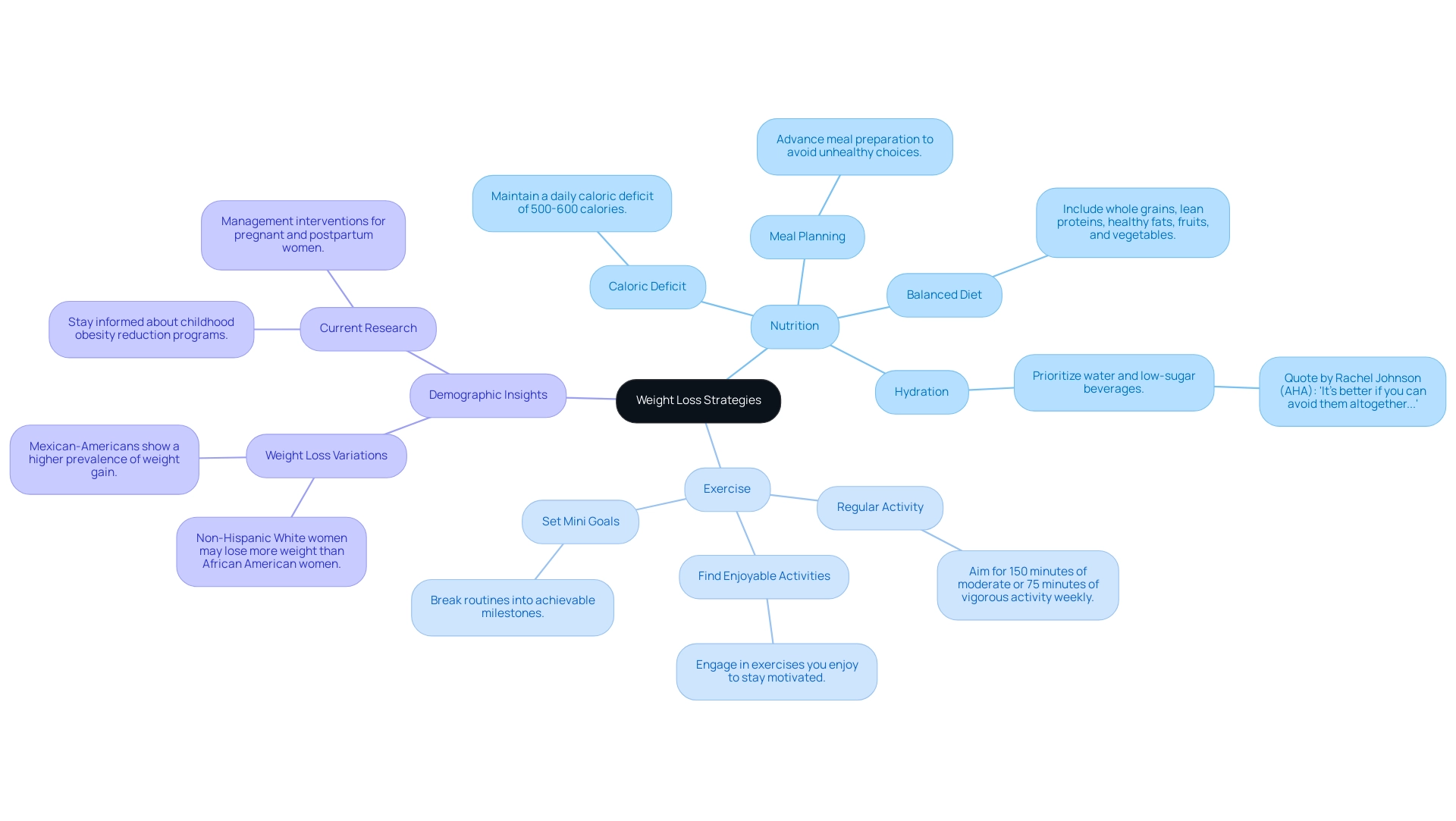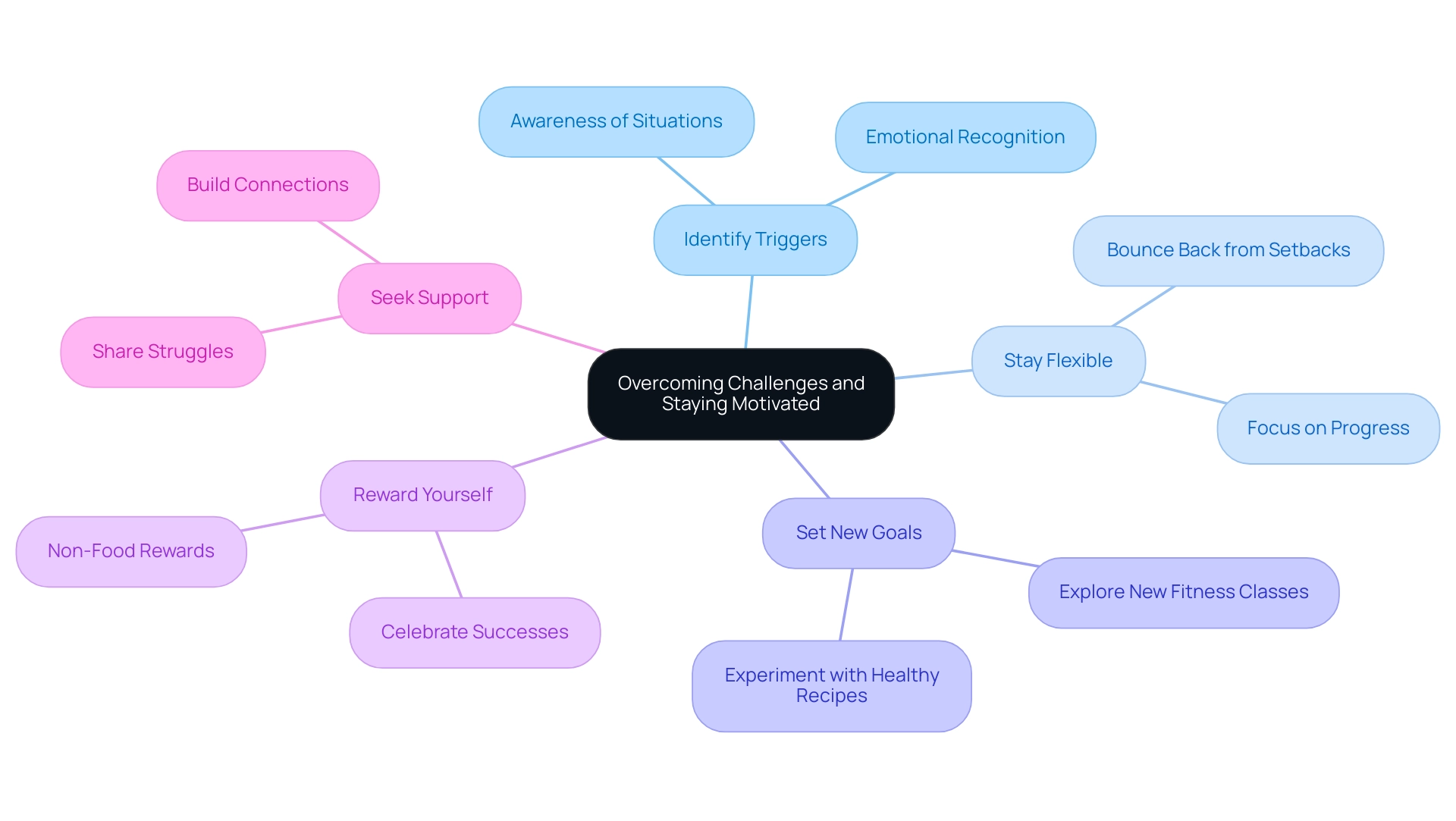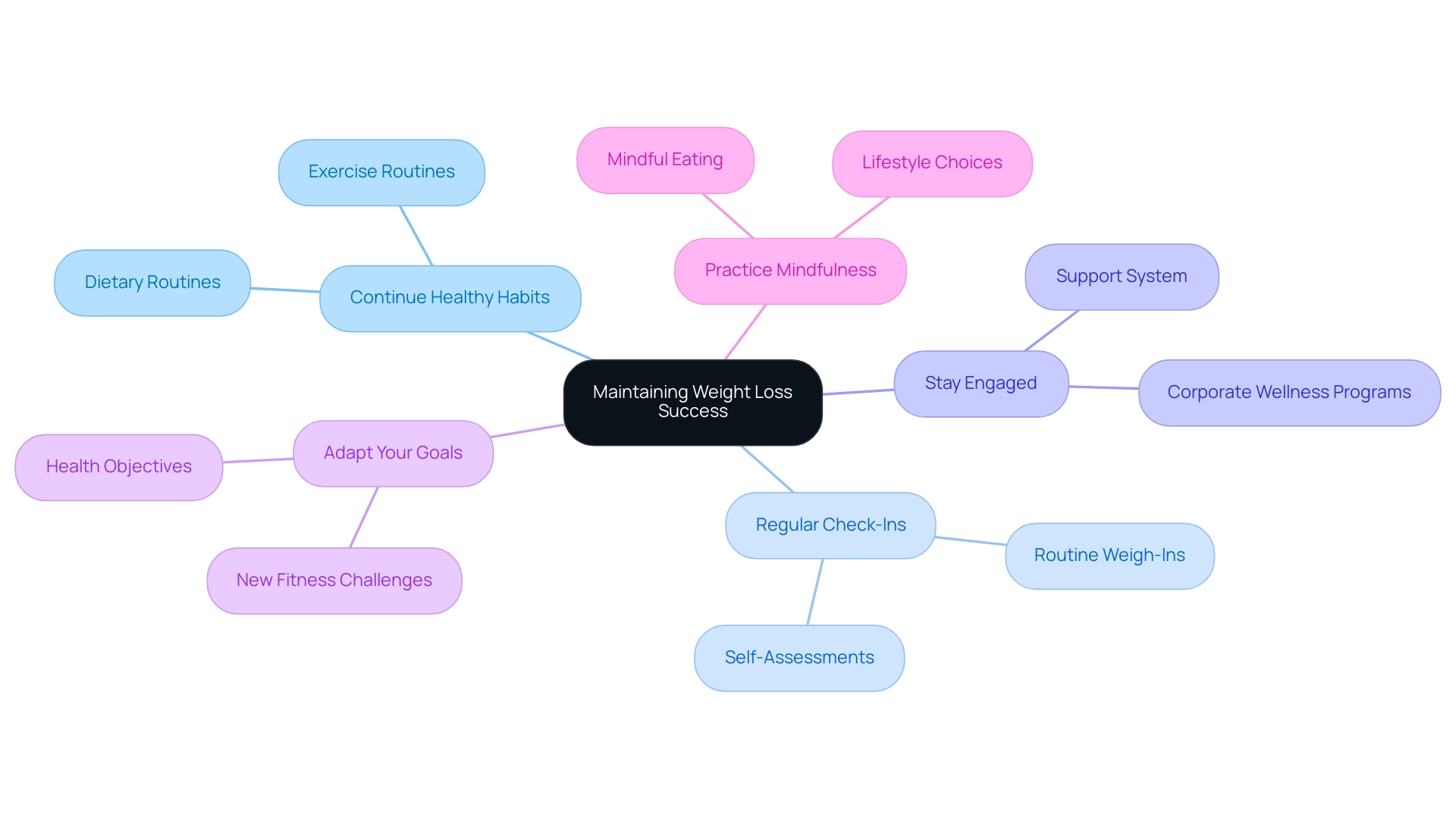Introduction
Embarking on a weight loss journey is a transformative experience that requires more than just determination; it calls for a strategic approach that lays the groundwork for success. As individuals assess their current health, set specific goals, and cultivate a supportive environment, they unlock the potential to achieve lasting change.
With the integration of personalized coaching and innovative wellness programs, the path becomes clearer and more attainable. This article delves into essential strategies for effective weight loss, emphasizing the importance of:
- Balanced nutrition
- Regular exercise
- Consistent progress tracking
By embracing these principles, anyone can foster a healthier lifestyle and ultimately thrive on their journey toward well-being.
Preparing for Your Weight Loss Journey
Embarking on a loss journey requires careful reflection on your motivations and a commitment to setting clear, achievable goals. Here’s how to lay a solid foundation for success:
-
Assess Your Current Situation: Begin by evaluating your present condition, overall health, and lifestyle choices.
This assessment will help pinpoint specific areas that need attention and improvement. -
Set Specific Goals: Instead of general ambitions like 'lose fat,' focus on precise targets, such as 'how many pounds can you lose in two months?'
Research indicates that individuals who establish moderate targets (5%-10% weight loss) have a dropout rate of just 0.40 at 24 weeks, compared to those striving for more than 10%.
This clarity not only guides your actions but also enhances your chances of staying committed. -
Create a Support System: Don’t start this path alone. Share your goals with supportive friends or family who can provide encouragement and hold you accountable throughout the process.
Additionally, consider leveraging Foresight Health Coaching's personalized fitness coaching and wellness programs to enhance your journey, which includes in-person wellness talks and comprehensive nutrition services tailored for corporate groups. -
Educate Yourself: Arm yourself with knowledge about healthy eating habits and effective exercise routines. Understanding what works will empower you to make informed decisions as you progress.
Foresight Health Coaching offers comprehensive nutrition guidance and workshops that can provide valuable insights, as well as individual coaching services specifically designed for high-performing individuals and athletes. -
Prepare Mentally: Imagine your success and remember the numerous advantages of shedding pounds, including enhanced health and elevated energy levels.
As highlighted by expert J. Iestra, a senior research dietitian at the University Medical Center Utrecht, mental preparation is vital for sustaining concentration on your objectives.
Additionally, the structured approach demonstrated in a recent case study involved two appointments, with the second occurring after eight weeks, and included reminders for participants. This approach sought to preserve involvement and commitment to achieving targets, akin to the continuous assistance offered through Foresight Health Coaching's application-based delivery system.
By adhering to these steps, you will create a solid foundation for a successful and lasting path to health. Each action taken not only brings you closer to your objectives but also contributes to your overall well-being. It's important to consider that while the study's strengths include a large sample size and prospective design, its observational nature and potential self-selection bias are limitations that should be kept in mind when interpreting the results.
Discover how Foresight Health Coaching can enhance your reduction objectives and overall wellness journey.

Diet and Exercise: Key Components for Effective Weight Loss
Reaching your fitness objectives necessitates a balanced method that successfully combines both nutrition and physical activity. With Foresight Health Coaching's comprehensive wellness coaching app, you have access to personalized workouts, nutrition guidance, and daily programming to achieve your health goals efficiently and conveniently. Here are essential strategies to guide you:
-
Nutrition:
- Caloric Deficit: To facilitate weight loss, it is crucial to maintain a daily caloric deficit of 500 to 600 calories. This statistic is important, as it can result in sustainable reduction over time. Utilize the calorie calculator within our app to identify your daily caloric needs, allowing for a clear path toward your goals.
- Balanced Diet: Emphasize a diverse range of foods in your diet—whole grains, lean proteins, healthy fats, and an abundance of fruits and vegetables are vital components. The app provides meal planning tools to help streamline your dietary choices and make healthy eating more accessible.
- Meal Planning: Advance meal preparation is key to avoiding unhealthy last-minute choices. Consider utilizing our app's meal prep features to maintain organization and stay on track, ensuring convenience in your daily routine.
- Hydration: Staying adequately hydrated is crucial, as our bodies often mistake thirst for hunger. Rachel Johnson, spokesperson for the American Heart Association, advises prioritizing water, fat-free or 1% milk, and low-sodium vegetable juices over sugary drinks.
-
Exercise:
- Regular Activity: Aim for a minimum of 150 minutes of moderate aerobic activity or 75 minutes of vigorous activity weekly, complemented by strength training on at least two days. The app allows you to track your workouts and progress, making it easier to stay committed.
- Find Enjoyable Activities: Engage in exercises that you genuinely enjoy, whether it’s dancing, swimming, or hiking. Enjoyment is a powerful motivator, making it easier to remain committed. Our app suggests activities based on your preferences, ensuring a personalized experience.
- Set Mini Goals: Break your exercise routine into achievable milestones, such as walking 10,000 steps per day or completing a certain number of workouts weekly. Use the daily programming feature to stay on track with your commitments.
-
Demographic Insights: It's important to acknowledge that reductions in mass outcomes can differ by demographic factors, which may influence how many pounds can you lose in two months. For instance, research indicates that non-Hispanic White women from high-income households may lose more mass compared to African American women, while Mexican-Americans show a higher prevalence of gain. Comprehending these dynamics can assist in effectively customizing interventions based on how many pounds can you lose in two months.
- Current Research: Stay informed about the latest systematic reviews on childhood obesity reduction programs and management interventions for pregnant and postpartum women, as these can provide valuable insights into effective strategies for reducing excess body mass. The application keeps you informed about the latest health trends, ensuring you have access to current information that can assist your journey.
By diligently managing your diet alongside regular physical activity and utilizing the supportive features of our health coaching app, you will establish a sustainable and effective plan that not only enhances your physical health but also contributes positively to your mental well-being.

Tracking Your Progress
To remain focused on your fitness journey, regular progress monitoring is crucial. Here’s how to effectively monitor your progress:
-
Weigh Yourself Weekly: Select a consistent day and time each week for weighing yourself, and make sure to record the results.
This practice allows you to observe trends over time, making it easier to identify what works for you. Remember, with regain rates reaching 80% after five years, consistent tracking is crucial for long-term success. -
Keep a Food Diary: Daily documentation of your meals is a powerful tool for accountability.
Not only does it help you stay mindful of your intake, but it also enables you to pinpoint areas for improvement in your diet. Research indicates that frequent dietary tracking is crucial for achieving long-term loss success. -
Measure Body Measurements: In addition to monitoring your mass, track measurements of key areas such as your waist and hips.
This method can reveal progress that the scale might not show, as it’s possible to lose inches even while your mass remains stable. -
Use Fitness Apps: Leverage technology by using fitness apps that allow you to log meals, workouts, and progress.
Foresight Health Coaching offers an innovative app-based delivery method, enabling you to access personalized support and guidance tailored to your needs.
These platforms often provide community support, which can bolster motivation and foster a sense of camaraderie. -
Reflect on Non-Scale Victories: Celebrate achievements that go beyond the scale, such as increased energy levels, improved mood, or enhanced physical fitness.
These non-scale victories are vital indicators of your progress and contribute to a positive mindset.
A study highlighted that an impressive 32.17% of individuals surveyed managed to reduce their mass during the pandemic, showcasing the potential for success even in challenging times. -
Engage in Corporate Wellness Programs: If you are part of an organization that offers corporate wellness programs through Foresight Health Coaching, take advantage of in-person wellness talks and comprehensive pantry services.
These options not only aid your reduction efforts but also promote a healthier workplace atmosphere.
By carefully monitoring your advancement through these techniques, you’ll acquire valuable insights that will not only guide your strategy but also strengthen your dedication to reaching your reduction objectives. Embrace these strategies to empower your team in their health endeavors!
![]()
Overcoming Challenges and Staying Motivated
Embracing challenges is an inherent part of any weight loss journey, but with the right strategies, you can stay motivated and see how many pounds you can lose in two months. Notably, 35.67% of North Carolinians lost weight during the worldwide pandemic, highlighting the widespread effort to achieve healthier lifestyles. In fact, a 2021 report from RunRepeat shows that 60% of adults in the U.S. want to live a healthier lifestyle.
Here are effective techniques to help you stay focused:
-
Identify Triggers: Awareness is key. Recognize specific situations or emotions that lead to unhealthy eating or a lack of activity.
By pinpointing these triggers, you can devise a proactive plan to counteract them.
-
Stay Flexible: Life is full of surprises. Understand that missing a workout or indulging in a treat does not equate to failure.
Instead of fixating on setbacks, concentrate on your ability to bounce back and maintain your progress.
-
Set New Goals: As you achieve milestones, continuously set fresh goals to keep your enthusiasm alive. This could involve exploring a new fitness class or experimenting with a healthy recipe, allowing you to keep your experience vibrant and engaging.
-
Reward Yourself: Celebrate your successes with non-food rewards, such as a rejuvenating spa day, stylish workout gear, or an exciting outing. These rewards can reinforce positive behaviors and keep your motivation high.
-
Seek Support: Don’t hesitate to share your struggles with friends, family, or support groups.
Building connections can offer encouragement and provide diverse perspectives on navigating obstacles. Legislative interventions, like corporate wellness programs, have demonstrated that 78% of employees would use company gyms, raising the question of how many pounds you can lose in two months with organized support.
By taking these proactive measures and promoting a positive attitude, you will be well-prepared to handle the challenges of your fitness path. Remember, the journey is just as important as the destination, and with determination and support, you can achieve lasting success.

Maintaining Your Weight Loss Success
Once you have reached your reduction goals, maintaining that progress is crucial for long-term health and well-being. Here are effective strategies to help you stay on track:
-
Continue Healthy Habits: It’s critical to maintain the dietary and exercise routines that facilitated your loss.
Consistency is the cornerstone of preventing a return to previous levels.
-
Regular Check-Ins: Establish a routine for weigh-ins and self-assessments to keep an eye on your progress. This allows for timely adjustments to your plan, ensuring continued success.
-
Stay Engaged: Actively engage your support system, including your corporate wellness programs. Sharing both your triumphs and obstacles can foster motivation and accountability, making it easier to stay committed.
-
Adapt Your Goals: As you stabilize your body, embrace new fitness challenges or health objectives offered through your wellness initiatives to infuse excitement into your journey.
This adaptability can keep your motivation high and your efforts fresh.
-
Practice Mindfulness: Cultivating mindfulness around your eating habits and lifestyle choices can lead to healthier decisions and help you avoid reverting to previous patterns.
Implementing these strategies not only allows you to reap the rewards of your hard work but also promotes a healthier lifestyle that can be enjoyed for years to come. Remember, a study from the National Weight Control Registry reveals that nearly all participants who successfully lost and maintained at least 30 pounds can help answer the question of how many pounds can you lose in two months through a combination of diet and exercise.
Moreover, statistics indicate that 95% of people attempting to shed pounds are often curious about how many pounds can you lose in two months to enhance their well-being, highlighting the importance of sustaining reductions for overall health. The health consequences of obesity are severe, linked to increased risks of type 2 diabetes, high blood pressure, and various cancers, which can raise healthcare spending significantly.
By investing in corporate wellness initiatives, organizations can not only assist their employees in sustaining health improvements but also achieve potential cost savings on healthcare expenses.
Furthermore, with loss surgery costing between $15,000 and $25,000, maintaining loss is not only a health concern but also a financial one for organizations. Specific features of wellness programs, such as regular health assessments and personalized coaching sessions, can effectively support these strategies.
By focusing on these key areas, you can significantly enhance your chances of long-term weight maintenance success while contributing to a thriving workplace environment.

Conclusion
Embarking on a weight loss journey is a multifaceted process that requires careful planning and commitment. By assessing one's current health, setting specific and achievable goals, and creating a robust support system, individuals can lay the groundwork for success. Incorporating balanced nutrition and regular exercise into daily routines is essential, as these elements work in tandem to promote sustainable weight loss. Utilizing tools like meal planning, hydration strategies, and personalized fitness coaching can further enhance this journey.
Tracking progress is equally important, as it provides valuable insights and accountability. Regularly weighing oneself, keeping a food diary, and celebrating non-scale victories can foster a positive mindset and reinforce healthy habits. Moreover, overcoming challenges and maintaining motivation are crucial for long-term success. By identifying triggers and setting new goals, individuals can navigate obstacles while remaining focused on their objectives.
Finally, sustaining weight loss requires ongoing dedication to healthy habits and engagement with support systems. Regular check-ins and adaptability in goals can keep the journey vibrant and rewarding. Investing in wellness programs not only benefits individual health but also promotes a healthier workplace environment. Ultimately, prioritizing these strategies empowers individuals to achieve lasting well-being and thrive in their health journeys.




